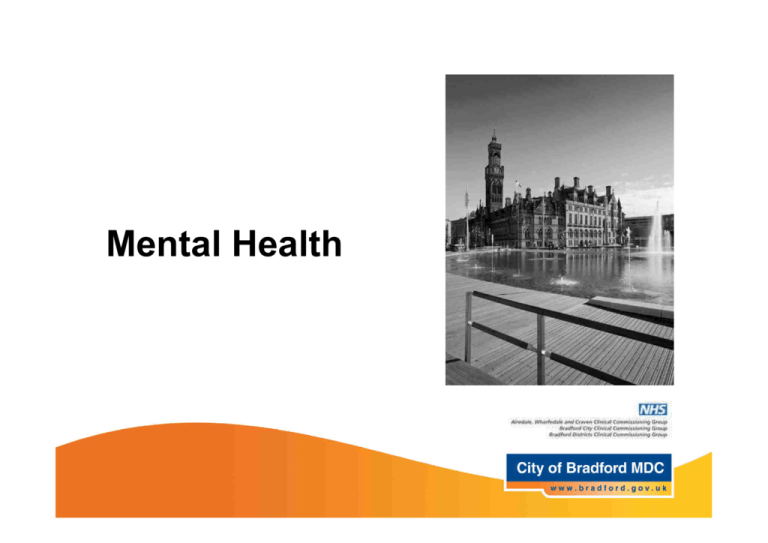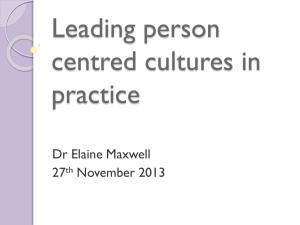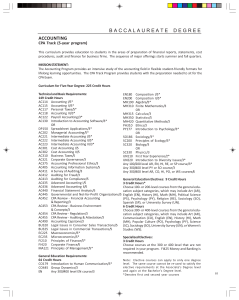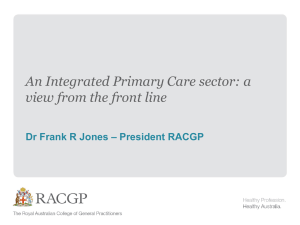Mental Health Presentation
advertisement

Mental Health Mental Health • Mental health issues will affect up to a quarter of the population at some time during a person's life. • Approximately one in a hundred people will be in need of specialist mental health services at any given time • The incidence of probable psychotic, neurotic and personality disorders are all expected to increase at a rate which is broadly in line with the projected general population increase Mental Health • Our strategic aims remain to help people to stay well and enjoy good mental health, to make it easy for people with mental health problems to get the right help early, to include families and carers in our help and support, and to provide high quality care to all those who need it. • We are committed to ensuring that the physical health of people with severe and enduring mental health problems is managed in a timely and effective manner. Mental Health • The national agenda for people with MH conditions is (where possible) to facilitate people living in their own homes either purchased/rented privately or in a supported living environment • But there are a cohort of people who require a higher level of support.. Mental Health transformation: • Development of a comprehensive range of appropriate support services to meet the needs of people with mental health problems. • Where possible, we seek to do so as close to home and in the least restrictive environment possible. • We will facilitate this by offering person centred plans of care and reablement and support services to promote and maintain independent living. Care Programme Approach • The Care Planning Approach (CPA) provides the framework for multi-agency planning and coordination of care. It has the service user at its heart and empowers service users to have the right to live their lives to the full as long as that doesn’t stop others from doing the same. The approach provides the framework to agree the network of care that will meet the person’s needs and make clear who is responsible for the delivery of this. The CPA such facilitate person centred planning approaches that identify what is important to a person from his or her perspective and find appropriate solutions. Safety • • Within mental health services there are increasingly people with complex presentations. The cause of these is complex and multifactorial: people may have experienced trauma in their lives, have treatment resistant conditions or have presentations that are complicated by issues relating to drug and alcohol misuse. It is becoming so prevalent that service providers should assume that many of the people to whom they provide services will be likely to display behaviours related to these issues. However, it is paramount that everyone involved in the care of such clients is focussed on ensuring the safety of the clients as well as other residents, staff as well as the wider public. It is essential that the contractor has a skilled staff team to support people with complex presentations including those whose behaviours may challenge the services at times. The contractor must work positively with clinical teams to provide services that are welcoming and appropriate to people with such complex presentations Physical Health People with long term mental health problems have severely reduced life expectancy and increased risk from a number of preventable long term health problems. Ensuring that a preventive approach is taken with this client group is a priority area. Working jointly with other providers, family carers and health professionals to meet people’s health needs •Supporting people in the most accessible way possible to make healthy living choices concerning exercise, diet and lifestyle and are consulted on the provision of balanced, healthy meals •Supporting people to access routine health appointments and interventions, such as dentists, chiropody and opticians •Assisting people to access primary care screening programmes as appropriate as well as preventive services, such as flu clinics •Provide opportunities to make healthy meal choices and to give people the opportunity to learn skills to enable them plan and prepare healthy eating options •To ensure that all clients have access to smoking cessation and nicotine replacement therapies to facilitate a reduction in known tobacco harms. Focus on recovery • Use CPA and person centred approaches to support people to retain connections with people they know from all parts of their lives. • Use CPA and person centred approaches and community connections to support and enable people to build new friendships. • Support people to take part in local activities with the community. • Ensure clients are supported to make a positive contribution to the community, have the opportunity to access paid employment, voluntary work and further education that leads to a career path and are supported to have an active social and leisure life that they choose. • Be creative around supporting people to learn independent skills to enable them to live more independently Focus on recovery • To move away from institutionalised group arrangements as far as possible, whatever living situation service users are provided with • Enabling people to personalise their living surroundings to reflect their own tastes and choices • Enabling people to change their current living environment to create a personalised home which reflects their lifestyle choices. • Creating flexibility in the management of the service to enable a personalised delivery of support plans – this includes flexible rosters, flexible meal choices and times, looking at changing the environment to give people the opportunity to learn skills such as cooking, managing own laundry to staying out late and inviting friends back for social events.











